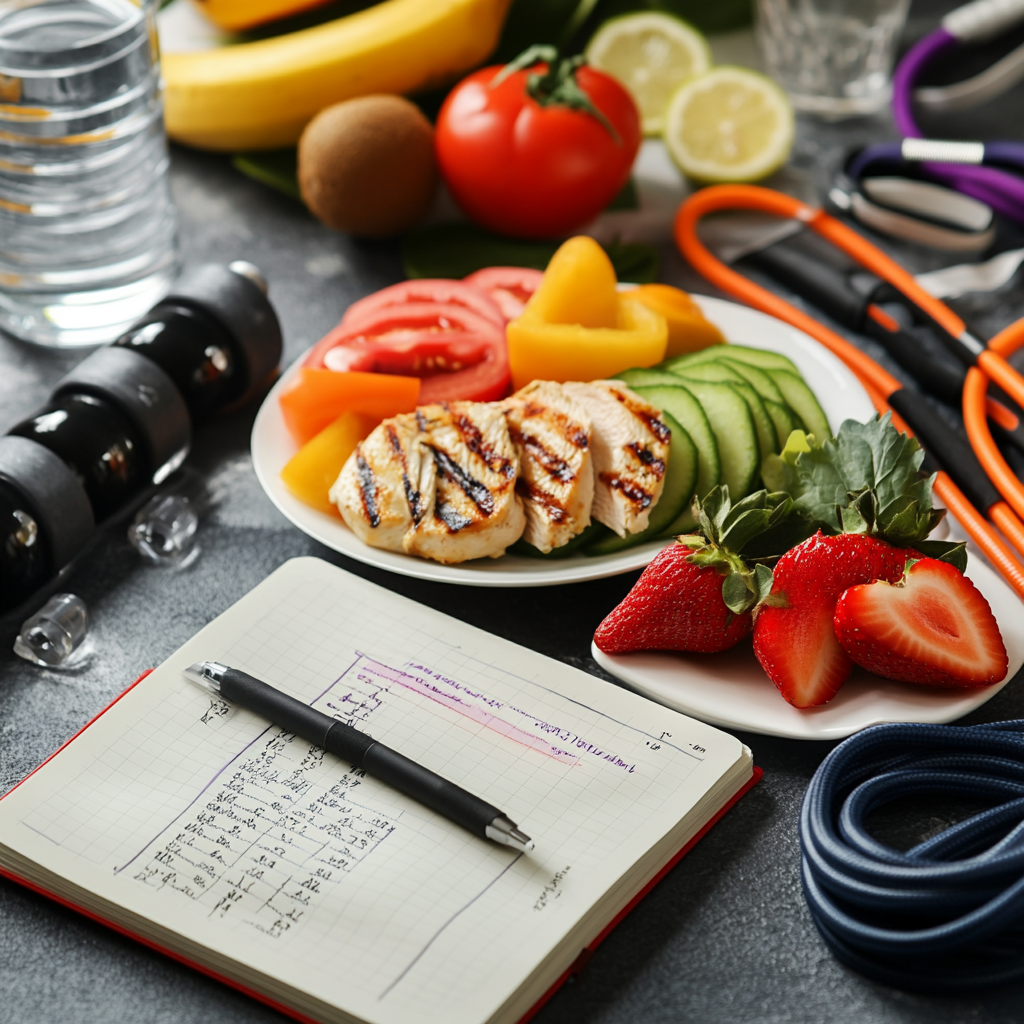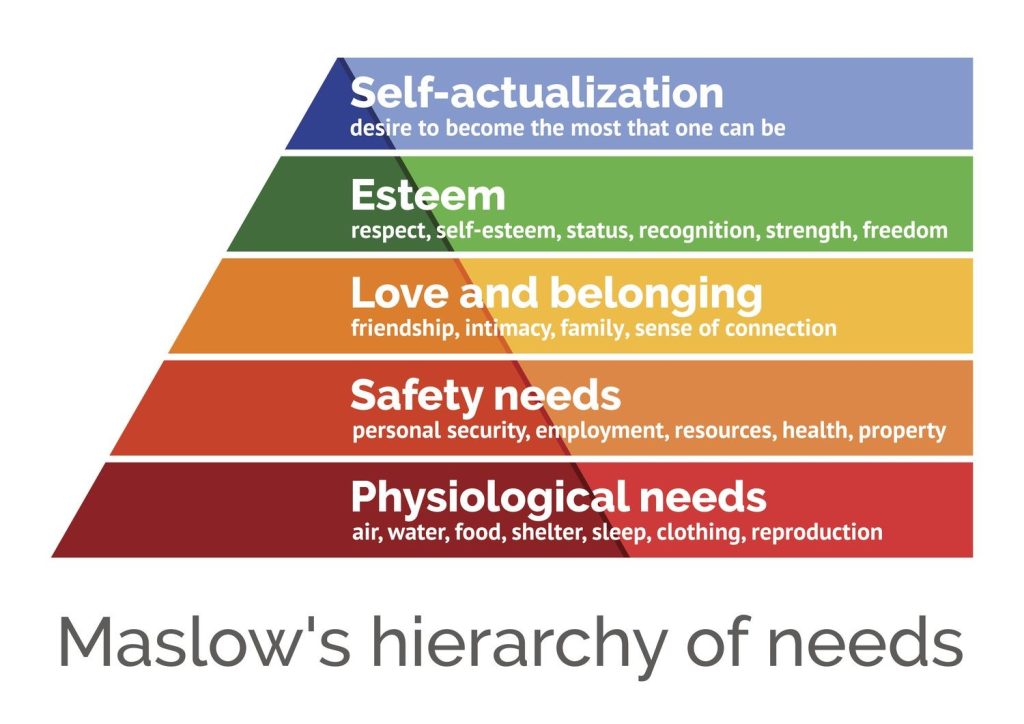
As we begin a new year, many of us think about ways to improve our lives. Taking care of our physical health—our “health behaviors”—is a powerful way to also care for our mental health. After all, mental health is health. We all have it, and taking care of both our bodies and minds is essential.
In my practice as a psychologist, I emphasize the connection between physical and mental health. The foundational elements of physical health—nutrition, hydration, physical activity, and sleep—are just as critical for mental well-being. These basic needs form the base of a self-care pyramid, similar to Maslow’s hierarchy of needs (figure below). Without a strong foundation, it’s hard to thrive. By focusing on these core health behaviors, we can better manage stress, build strong relationships, and work toward becoming the best versions of ourselves.
Let’s take a closer look at how these building blocks support both physical and mental health—and how small, consistent changes can lead to lasting improvements.

Nutrition: Food is Medicine
What we eat fuels not only our bodies but also our minds. Proper nutrition provides the energy we need for physical performance and the nutrients necessary for optimal brain function.
Physical Health Impacts: Balanced nutrition supports a healthy immune system, stable energy levels, and the regulation of blood sugar and cholesterol. Poor eating habits can lead to chronic conditions like diabetes, obesity, and cardiovascular disease.
Mental Health Impacts: The brain relies on a steady supply of nutrients to produce neurotransmitters like serotonin and dopamine, which regulate mood and emotions. Diets high in processed foods (anything packaged) and low in essential nutrients impact our energy levels (e.g, stamina, speed, fatigue, crashes). We can feel sluggish, jittery, low; and not only can be mistaken for symptoms of depression or anxiety, but also have been linked to depression and anxiety conditions.
Practical Tip: Start by incorporating more whole foods like fruits, vegetables, lean proteins, and whole grains into your meals. When grocery shopping, stick to the outer aisles of the store. Aim for consistent eating patterns to avoid energy crashes and mood swings.
Recommendation to work towards: Personalized nutrition needs depend on factors like age, sex, health status, and activity level. Consult a licensed healthcare provider or use resources like the USDA MyPlate Plan (https://www.myplate.gov).
United States Department of Agriculture (USDA). (2021). MyPlate Plan: Your personalized guide to healthy eating. Retrieved from https://www.myplate.gov
Hydration: Water is Essential
Our bodies are approximately 60% water, and even mild dehydration can have significant physical and mental effects.
Physical Health Impacts: Proper hydration regulates body temperature, supports joint health, and aids in digestion and cardiovascular function. Dehydration can lead to headaches or other body aches, fatigue, muscle injury, and poor physical performance.
Mental Health Impacts: Dehydration is linked to decreased focus, memory, and mood stability. It can also worsen feelings of stress and anxiety.
Practical Tip: Carry a water bottle with you throughout the day and sip on it. If you feel thirsty, you are already dehydrated. Adjust for your activity level and environment.
Recommendation to work towards: A rule of thumb is to drink at least eight 8-ounce glasses of water daily. Another estimation is to drink 1/2 an ounce per pound of bodyweight. For example, a person weighing 200 pounds would drink 100 oz/day. For more information on hydration guidelines, see Mayo Clinic (2022), which discusses the role of hydration in health and wellness: https://www.mayoclinic.org/healthy-lifestyle/nutrition-and-healthy-eating/expert-answers/water/faq-20058377
Physical Activity: Exercise is Medicine
Movement is essential for both physical and mental health. It’s not just about how you look but how you feel and function.
Physical Health Impacts: Regular exercise strengthens muscles, improves cardiovascular and brain health, and helps maintain a healthy weight. It can reduce the risk of chronic diseases and improve overall mobility and strength. Physical activity can also reduce the experience of pain. Motion is lotion.
Mental Health Impacts: Exercise is a proven mood booster. It releases endorphins and reduces levels of stress hormones like cortisol. Physical activity enhances sleep quality and cognitive function. It is also an energy booster. Feel tired and don’t have a particular reason? You may need to get the blood flowing!
Practical Tip: Start with your current activity level and make small, manageable changes. That may mean to start parking in the back of the parking lot vs the front, adding 2-5 minutes of walking or time of whatever movement you are doing, adding a day a week to your cardiovascular or resistance training. No matter how active or elite you are, give yourself a full day of rest/week. Rest and recovery are also part of our basic needs.
Recommendation to work towards: Aim for at least 150 minutes of moderate aerobic activity per week, such as walking, biking, or swimming. Strength training exercises at least twice a week are also beneficial. (American Heart Association, 2019). https://www.heart.org/en/healthy-living/fitness/fitness-basics/more-steps-stronger-heart
Sleep: Rest to Recharge
Sleep is the ultimate recovery tool for both body and mind. It’s as important as nutrition and exercise.
Physical Health Impacts: Adequate sleep supports immune function, cell repair, and energy levels. Chronic sleep deprivation is linked to increased risk of heart disease, obesity, and diabetes.
Mental Health Impacts: Sleep directly affects mood, focus, and emotional regulation. Poor sleep leads to poor decision-making and can impact eating habits, hydration, and exercise routines. Sleep is also both a symptom and a contributor to mental health issues like anxiety and depression. That aside, who feels good after a poor night or nights of sleep? No one!
Practical Tip: Work to establish a consistent sleep routine of bedtime and wake time with a calming pre-sleep environment by limiting screen time and practicing relaxation techniques.
Recommendation to work towards: Sleep recommendations also vary somewhat by age and health status; however, 7-9 hours/night (during dark hours), is a good guideline (National Sleep Foundation, 2021). Folks usually need more sleep than they believe. https://www.sleepfoundation.org/how-sleep-works/how-much-sleep-do-we-really-need
Building the Pyramid: Beyond the Basics
Once your foundation is strong, you can focus on higher-level self-care practices like:
- Stress Management: Techniques like mindfulness, journaling, deep breathing, and visualization, can help you handle challenges.
- Enjoyable Activities: Prioritize hobbies and activities that bring you joy and fulfillment, that you do simply for the sake of enjoyment.
- Social Support: Nurture relationships with friends, family, and teammates. Connection is a vital part of mental health. Adding social support, a “buddy” to physical activity, nutrition, or enjoyable activities magnify the ability to be consistent.
Getting Started: Small Steps to Big Changes
Each practical tip given for these domains of nutrition, hydration, physical activity, and sleep, are launching pads to create your discrete steps on your way to larger recommendations for healthy lifestyle maintenance. You take charge by creating sustainable health habits incremental with SMART goals:
- Specific: Choose a clear, actionable goal, like drinking 64 ounces of water daily.
- Measurable: Track your progress with a journal or app.
- Achievable: Set realistic expectations based on your current lifestyle.
- Relevant: Ensure your goal aligns with your values and priorities.
- Time-bound: Set a timeline to evaluate your progress, like one week or one month.
This is not all or nothing. Progress matters more than perfection. For instance, if you aim to drink 64 ounces of water daily but only manage 50 ounces some days, you’re still moving in the right direction. Consistency over time is what leads to lasting change. It is practice. The more you practice the easier it gets. We all have slips, dips, and falls; and what you do more consistently wins. So pick yourself up, brush off the dirt, and keep practicing: one step at a time. Remember, the key to success is not just starting but maintaining changes through consistent effort.
Conclusion: Preparing for Tomorrow
Your physical and mental health are deeply connected. By strengthening the foundation of your self-care pyramid, you set yourself up for success in all areas of life. As you embark on your journey toward better health this year, keep these “Eva-isms,” or guiding principles, in mind:
- “Today prepares you for tomorrow.” Be present in the day, how you live your today, moves you into the tomorrow(s).
- “Anything of value requires ongoing, consistent effort.” What we do to achieve, we must continue to do to maintain.
Start building your foundation today, and watch how it supports not only your physical health but also your mental well-being. With any or all of this, I can help you with these behavior changes for physical and/or mental health. You do not have to do it alone or try to figure it all out yourself. Contact me. This is what I do! My passion is helping you feel better, do better and be better by taking care of your body and your mind. If you have questions or want help, contact me. I provide free 15-minute virtual consultations (https://evaserber.clientsecure.me/) to discuss your goals and determine fit.
Today prepares you for tomorrow. Anything of value requires ongoing, consistent effort.
– Eva Serber, PhD, LLC
